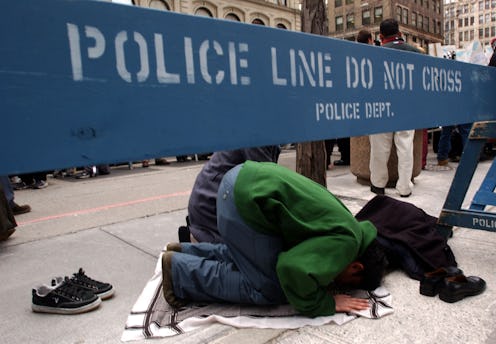Last week, police in Avon, Ohio, confronted a Muslim businessman from the United Arab Emirates because the desk clerk at his hotel panicked upon seeing his robes and head scarf, and she claimed she thought she heard him pledging allegiance to ISIS. The businessman, 41-year-old Ahmed al-Menhali, was pushed to the ground and handcuffed outside the Fairfield Inn and Suites, where he was staying, at which point police reportedly searched his clothes and wallet. Avon's mayor and chief of police have since apologized to Menhali, but the incident is the latest example of racial profiling in America which targets Arabs and Muslims.
In response to what happened to Menhali, the UAE warned its citizens on Sunday to refrain from wearing traditional clothing abroad, and it's easy to understand why. Early last year, The Washington Post reported that hate crimes against Muslims in the U.S. are roughly five times more likely now than they were before the September 11 attacks. Hate crimes also tend to spike immediately after terrorist attacks. Brian Levin, a professor at California State University San Bernardino, found that there were 38 anti-Muslim hate crimes in the U.S. in the month following the November 13 Paris attacks, 18 of which happened after the December 2 mass shooting in San Bernardino, California.
While there is legislation against hate crimes — though it doesn't seem to prevent them from actually happening — racial profiling of Arabs and Muslims is rampant. At airports, TSA officials have long been accused of unfairly detaining and questioning people for just "looking Muslim," and they're not the only ones implicated in racial profiling reports. Earlier this year, a University of California Berkeley student named Khairuldeen Makhzoomi was removed from a Southwest Airlines flight after a fellow passenger reported him for speaking Arabic in a way that was "perceived to be threatening." Last November, four people of Middle Eastern descent were removed from a Spirit Airlines flight for "suspicious activity" which involved one of them watching a news report on his phone.
Airports aren't the only problem, either. Back in 2012, the NYPD was found systemically monitoring Muslim college students well outside New York, going so far as to send an undercover officer on a whitewater rafting trip with 18 Muslim students from the City College of New York, even though there was no evidence implicating any of the students. An Associated Press report about the NYPD's systematic surveillance of Muslim communities described how many regular mosque-goers decreased their attendance after encountering undercover officers and feeling unsafe.
Although ISIS has been responsible for numerous attacks against Muslims during Ramadan, many counterterrorism efforts specifically target Muslims and anybody who might "appear" Muslim — even after the government has admitted that "lone wolf" attackers are the primary threat of homegrown terrorism in the U.S.
It is absolutely necessary to oppose racial and religious profiling, especially at a time when presumptive GOP presidential nominee Donald Trump relies on profiling to encourage a fear of the "other" in his supporters. Ramadan is coming to an end as I write this, and during this holy month for Muslims, too many lives were lost. Menhali should not have faced the threats that he did, nor should Muslims around the world have to constantly feel unsafe.
